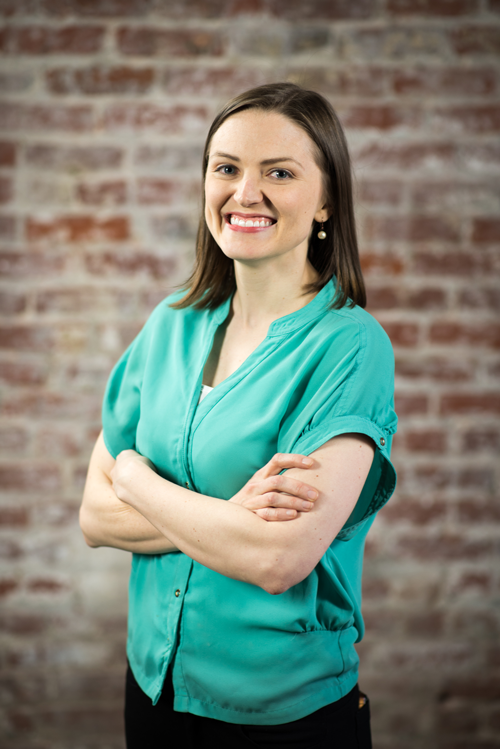Introduce yourself! Who are you? Where do you work?
Hi, I'm Michelle Glauser. I'm the founder and CEO of Techtonica, a nonprofit that offers local women and non-binary adults with low incomes free tech training with living stipends and job placement. I'm also a software engineer, the lead organizer for PyLadiesSF, and on the leadership team of Diversity Advocates. In 2015, I spearheaded the #ILookLikeAnEngineer ad campaign. LinkedIn chose me as one of the top 10 professionals 35 and under for software and Upworthy has featured my work.
Who or what got you into programming?
In 2012 I was working at a startup in San Francisco and I was barely able to pay my rent. I kept looking at the engineers and thinking that what they were doing was so cool and that they were clearly making more money than I was. I started Googling how to build a website and found some information about an intensive software engineering training program—this new thing called a coding bootcamp that no one knew about at that point. I ended up figuring out a way to attend even though I couldn’t afford the tuition (which is one-third the cost of what it is now). I loved what I learned and was able to find a job and triple my income within a couple of weeks of graduating.
How was the bootcamp experience at Hackbright? Who do you think would best benefit from that style of education?
Attending Hackbright was a really eye-opening introduction to software engineering and the tech industry. Honestly, at that point since Hackbright was so new, the program wasn't yet well-organized. I think it's very well-oiled now, but still, people should be very independently motivated and prepared for an intense, life-changing experience. Push through being overwhelmed— you will learn a lot and make more progress than you would elsewhere.
How do you think the tech industry will change over the coming years, and how might that affect your role?
I think the changes we’ll see in the tech industry over the next few years will be similar to changes we’ve seen before—stacks will come and go and people will create hundreds of different chat apps. I hope to see the industry become more diverse and inclusive as it grows to be an integral part of many careers and cities all over the world, because without inclusion, teams cannot become or maintain being diverse. Without diversity, teams will not be as successful as they could be because they’ll build products that are best for a limited number of people.
What has been your toughest lesson to learn in your software career so far?
To grow, you have to be vulnerable and show that you have growing to do even though everyone else seems to already have everything figured out. Being vulnerable is actually great for everyone around you as well—they can then show that they have growing to do as well and together, you can figure out a plan forward instead of fumbling along in the dark alone.
What would be your number one piece of advice for a successful software career?
My number one advice for people who want to have a successful software career is to build social capital. Building software is a collaborative process—you're going to need those connections when you are looking for help solving problems. Also, your connections will help you find jobs—maybe not this year or next year, but at some point, having a lot of connections will be helpful.
Have you got any hobbies outside of your job? Do you think they help your tech career in any way?
I like to read, bake, hike, go to the park, and watch dogs with my spouse. Hobbies are absolutely helpful to my tech career—they keep me from burning out while working in an industry and area where it’s the norm to focus only on working and getting ahead.
What books/resources would you recommend for others wanting to follow a path similar to yours?
You can learn so much online that it can be overwhelming (I even have a Google Doc that lists hundreds of learning-to-code links). With a mentor, map out a long-term pathway and focus on the technologies you need for that pathway instead of getting distracted by every new thing.
Use Twitter and attend (and maybe even help organize and speak at) events to build your tech network. A good book to learn how to network well is Captivate by Vanessa Van Edwards.
Also check out Camille Fournier’s The Manager's Path: A Guide for Tech Leaders Navigating Growth and Change and Hot Seat: The Startup CEO Guidebook by Dan Shapiro.
Techtonica is an awesome initiative, which inspires me to ask – what do you want your legacy to be?
I want my legacy to be one that inspires people to do their best to expand their reach, lift others, and improve the world. I care deeply about empowering people without a lot of privilege. Just think what it would be like if everyone felt that way—we’d all be helping each other and would see a lot more unity and equality.
Finally, make your shoutout! What would you like the readers to go have a look at?
For the past few years, I’ve been working on breaking down barriers into tech for the people most underrepresented in tech and most in danger of displacement by tech. This labor of love and nonprofit is called Techtonica and is currently focused on the San Francisco Bay Area. We need volunteers, donations, and most of all, companies to sponsor and hire our trainees. Donate and find out more to get your companies on board at techtonica.org.
